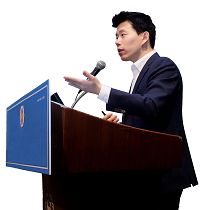As long as we live within the framework of capitalism, where private ownership of property is allowed, we are not all free from the parasitic survival instinct in such an institutional framework. That’s why we can’t just blame such behaviours on the two families in the movie.
“Have you watched Parasite?” “Hey, you should watch Parasite!” Words that are hardly ever used are suddenly on everyone’s lips. Has the word “parasite” ever been so popular in media in the past? Certainly never in the past, probably not in the future. I don’t even know when I’ve ever used the word. Last week, Bong Joon-ho’s 2019 film Parasite swept the board at the Oscars, creating an opportunity for people around the world to re-evaluate South Korean films. Now, South Korea has further strengthened its soft power by adding the name Bong Joon-ho, along with Psy and BTS, to its lexicon. Indeed, such achievements have raised South Korean pride.
The film depicts two families as parasites. They are employed as housekeepers, a chauffeur and private tutors by a wealthy family and enjoy their lives by taking money from employers. They buy the employers’ trust with forged certificates and lies. While the employers are away, they enjoy the nightlife as if the house were their own. Sometimes they maximise profits by talking behind someone’s back. The audience smiles bitterly at their behaviours. This is because they showed the best use of flattery to pursue survival and happiness under capitalism. Meanwhile, at the end of the movie, they also express their betrayal and anger toward one of their employers by stabbing him to death. Throughout the movie, the two families are portrayed in a rather negative light.
But while I was watching the movie, I realised that the behaviours of the two families were not much different from the way we live. The lexical meaning of “parasite” is summarised as follows. Firstly, according to Merriam-Webster, it is “a person who exploits the hospitality of the rich and earns welcome by flattery”. Secondly, as “a person who always relies on or benefits from other people and gives nothing back,” according to Oxford Learner’s Dictionary. Looking closely at these two meanings, they are strangely similar to our daily lives. In particular, many office workers come to mind.
Under the capitalist system, many office workers today devote their sweat, effort, and time to their organisations. Sometimes, people put their organisation first, before their family. These organisations today are characterised by the use of a hierarchical organisation structure that enables capitalists to make profits more effectively. In this hierarchy for profit, every office worker looks up at the peak of the pyramid every day. A smile is essential to get a good appraisal from bosses. Sometimes flattery is used to buy favours from bosses. All of this comes from the survival instinct of the workers to achieve promotion, higher pay, and job security under the hierarchical organisational structure. The majority of office workers forget their gratitude within a few days, right after successfully completing their tasks with the help of colleagues. For them, the greatest goal on earth is to get an “A” on their performance appraisal; all the rest is just a tool to achieve this (although it should be said it doesn’t mean that every office worker behaves like that).
Now, let’s compare the two families in the movie, and the office workers. They try to flatter for the maximum happiness that can be pursued under capitalism and pursue their own interests – and survive - through backbiting. And they use the favour of the other party to maximise profits. Of course, there is no return for it. Are there any strange commonalities found?
Under the capitalist system we live in, there are parasites living in semi-basements (or “banjiha” as they are known) like the two families in the movie, and parasites living in a sunny, warm office environment. As long as we live within the framework of capitalism, where private ownership of property is allowed, we are not all free from the parasitic survival instinct in such an institutional framework. That’s why we can’t just blame such behaviours on the two families in the movie.
We cannot live alone in the world, entangled like a tight net. We all need help from one another. It is very difficult for us all to be free from the parasite fight for survival and competition in the net, as everyone knows. If we can’t change such a system, why don’t we change our parasite “roles”? I believe we can all live as more sophisticated and beautiful “capitalist parasites.” If we would have open conversations rather than backbiting, and heartfelt conversations rather than resorting to flattery, we would all be able to “play” more sophisticated parasites.
Don’t forget to express your gratitude to those who helped you as you climb toward the peak of the pyramid. We do, indeed, reap what we sow. Undeniably, we all live in a capitalist jungle with some form or other of parasites. Just as there are “parasites” in our bodies that help the body function, sophisticated and cultured “capitalist parasites” will help human relationships function.
Chang KIM is a research fellow at The Cairns Institute, Australia. He serves as an executive director of the Korean Association of Human Resource Development in South Korea.
____________
Are you a recognised expert in your field? At Euronews, we believe all views matter. Contact us at view@euronews.com to send pitches or submissions and be part of the conversation.












